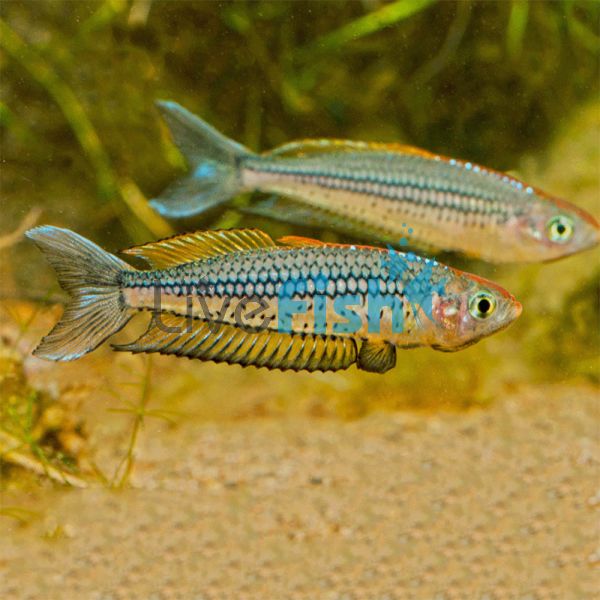Rhad - Bribie Island 3.5m
Rhadinocentrus or Rhads are a stunning species in the rainbowfish family, they often get overshadowed by the Melanotania’s and Pseudomogil’s however these fish are just as beautiful. These Rhads are from Bribie Island which is an island just off Queensland which means they come from a fairly small geographic range making them a super unique fish. Adding these fish to a mixed rainbowfish display or preserving the species in captivity through a biotope aquarium would be stellar.
- Buy 5 for $11.63 each and save 10%
- Buy 10 for $10.98 each and save 15%
- Buy 20 for $10.34 each and save 20%
Rhad - Bribie Island
Rhadinocentrus or Rhads are a stunning species in the rainbowfish family, they often get overshadowed by the Melanotania’s and Pseudomogil’s however these fish are just as beautiful. These Rhads are from Bribie Island which is an island just off Queensland which means they come from a fairly small geographic range making them a super unique fish. Adding these fish to a mixed rainbowfish display or preserving the species in captivity through a biotope aquarium would be stellar.
Bribie Island Rhads have a look that is almost exclusive to the Rhadinocentrus family and not observed in any other fish. They have a very arrow-shaped body, and the pointed face with a thin, slender body really shows off the beauty of these fish. The body colour is a gradient of olive green from the back to creamy silver near the belly. Overlaid on this is a jet black honeycomb patterning of scales which runs into the ventral fin and tail as a rim. To contrast all of this, the most recognizable factor of these fish is the deep orange present on the top of the face which runs to the dorsal fins as well. As these fish swim and catch light the metallic scales reflect amazingly which adds a beautiful shimmer.
Breeding these Rhad Rainbows in the home aquarium is possible as males tend to grow larger and show far more vibrant colours as well. Females also tend to have lighter black scale patterning with smaller fins as well. As juveniles, it can be hard to sex them however getting a group of 5-6 ensures a decent mix of males and females for breeding purposes. Once these fish
reach maturity, they tend to breed on an almost daily basis and aquarists often use breeding mops to collect the eggs and rear them in a separate tank.
Tank Recommendations for your Rhad - Bribie Island
As the Bribie Island Rainbow Fish do reach around 6 cm, but more importantly are active, it is best to keep them in an aquarium with a minimum volume of 70 liters for a trio of one male and 2 females. For a larger school, it is best to go above 180 litres as this ensures that they can be kept in a school and have ample swimming space as well. The Rhad Rainbow is totally plant-safe and will not only love but also look great in a well-planted aquarium. They are mostly mid to top water-dwelling fish so the choice of substrate and aquarium hardscape is not a major concern. They are however excellent jumpers so a tight-fitting lid is a must for the aquarium. Bribie Island Rhads are also tropical fish that are best kept at 24-26 degrees.
Suitable Tank Buddies
The Bribie Island Rhad is incredibly peaceful but due to their speed, they may potentially outcompete slow or bottom-dwelling tank mates. They can however be kept in a wide range of community aquarium settings and with other rainbow fish strains.
Usually Compatible
Other rainbow fish species, a range of tetra species such as Lemon Tetras, Black Widow Tetras, and Congo Tetras along with Danio species as well.
Sometimes Compatible
Celestial Pearl Danios, Emerald Rasboras, Pygmy Corydoras, and other small, slow-moving fish.
Rarely Compatible
Aggressive species may prey on the Bribie Island Rhad or any incredibly small species such as shrimp which may be eaten by the rainbow fish.
Feeding your Rhad - Bribie Island
Rhad Rainbow fish will take to aquarium foods very easily. They will take a wide range of pellets, flakes, and frozen foods. By giving them a varied diet, it ensures that they have optimal nutrition.
The ideal diet would be good quality floating food, supplemented with frozen bloodworms or black worms or even live foods like baby brine shrimp or micro worms. Feeding any foods with natural colour enhancers would also be great as this will really enhance the metallic oranges.
| Scientific Name | Rhadinocentrus Ornatus |
|---|---|
| Care Level | Easy |
| Common Names | Rhads, Orange Rhads, Bribie Island Rhads, Rhad Rainbowfish |
| Diet | Carnivore |
| Fish Family | Melanotaeniidae |
| Lifespan (years) | 5 |
| Max. Length (cm) | 6 |
| Min. Tank Volume (l) | 70 |
| Origin | Australia |
| Reef Safe | Yes |
| Sociability | Peaceful |
| Venomous | No |
| Water Conditions | 24-26° C, pH 6.5-7.5 |
-
0Hi there, what colours/patterns of the (Rhadinocentrus ornatus) do you have in stockRead Detail
 Submited by: Drew Fisher
Submited by: Drew Fisher
 25 May 2021
25 May 2021
-
Hi, Rhadinocentrus are very popular and stock sells out really quickly and we don't have any to look at right now so if you can email us directly at info@livefish.com.au we can check with the warehouse when they are back in stock.Answered by Admin on 24 Jun 2021
-
- 1




